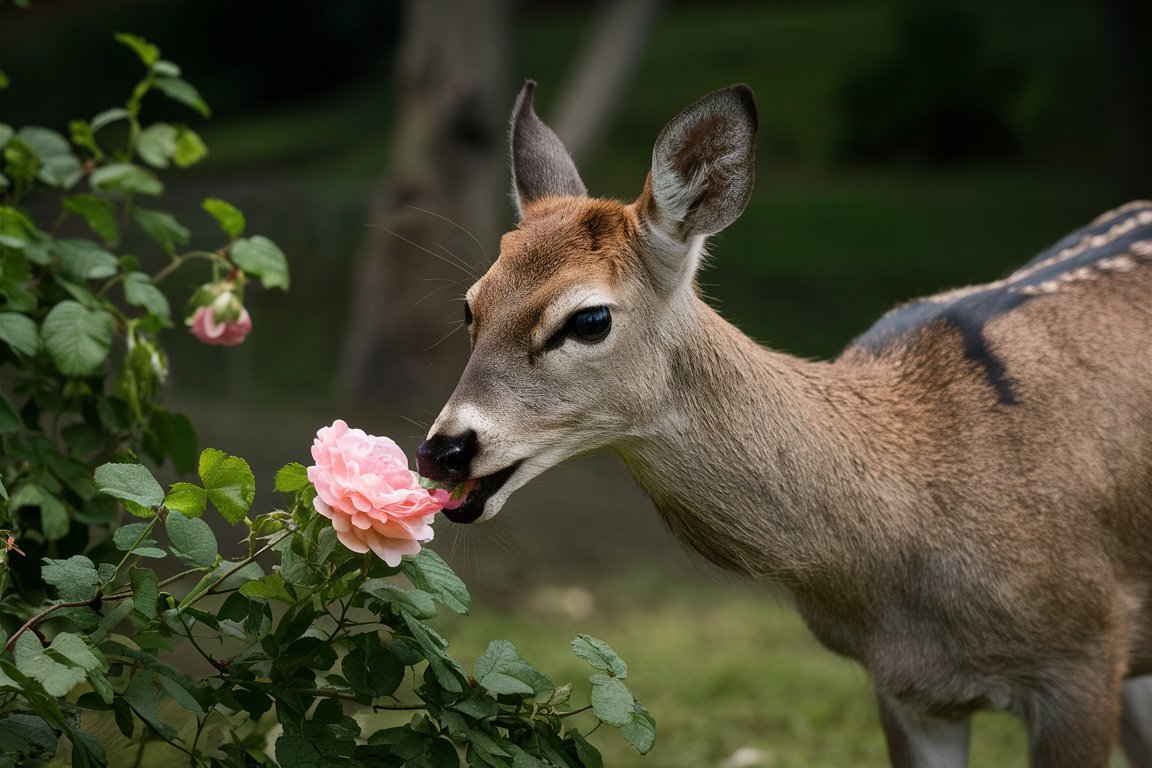Yes, deer are known to feed extensively on roses, consuming their buds, blooms, foliage, and even the canes.
As highly adaptable herbivores, deer have a diverse diet that includes a wide range of plant matter, making roses particularly vulnerable to their feeding habits.
To learn more about deer-resistant techniques and eco-friendly repellent solutions, continue exploring the thorough information provided.
Table of Contents
Understanding Deer Dietary Habits

Deer are herbivorous mammals that mainly subsist on a diverse array of plant matter, including leaves, twigs, buds, and other vegetation. As part of this diet, deer often find roses to be an appealing target due to their tender new growth and buds.
On average, deer can consume between 5 to 15 pounds (2.5 to 7 kg) of plant material per day, making rose bushes particularly vulnerable to their feeding habits.
Deer tend to prefer the softer thorns and young growth on rose bushes, leading to significant damage if left unprotected. This damage can occur mostly at night, as deer are less likely to browse during the day.
Understanding this feeding behavior is vital for gardeners who aim to implement effective strategies to protect their prized rose bushes.
Coexisting With Deer in Gardens

As urban development continues to encroach on natural habitats, the need for effective strategies to coexist with deer in residential gardens has become increasingly pressing.
Sustainable coexistence strategies must balance the presence of deer with the preservation of garden aesthetics and plant health. Eco-friendly deterrents, such as natural repellents and physical barriers, offer a viable solution for minimizing deer damage without harming the environment.
Community engagement and sharing experiences among gardeners can foster innovative approaches to this challenge. Deer-resistant plantings, for instance, can help create visually appealing gardens that are less attractive to these foraging animals.
In addition, collaboration within neighborhoods can lead to the implementation of coordinated deterrence methods, ensuring a cohesive and effective response to the issue.
Eco-Friendly Deer Repellent Solutions
Eco-friendly deer repellent solutions offer a viable approach to safeguarding gardens from deer damage while minimizing environmental impact. These all-natural products, such as Deer Solution, leverage a combination of carefully selected ingredients to create an effective barrier against foraging deer.
Regular applications of these eco-friendly repellents are essential to maintaining their efficacy, particularly after rain or when new plant growth appears. The tailored application processes guarantee thorough coverage, making it easier for gardeners to protect their rose bushes and other valuable plants.
Feedback from customers indicates that these eco-friendly solutions not only deter deer but also contribute to improved plant health and liveliness.
Deer Damage to Rose Bushes
Roses are a popular garden ornamental that often falls victim to the voracious appetite of deer. These majestic herbivores are known to consume all parts of the rose bush, including the buds, blooms, foliage, and even the canes, with a particular fondness for the tender new growth due to its softer thorns. On average, deer can devour between 5 to 15 pounds (2.5 to 7 kg) of plant material daily, leading to significant damage in gardens.
Deer damage to roses typically occurs at night, as they are less likely to browse during daylight hours. To aid recovery, watering the damaged roses with Super Thrive and avoiding heavy fertilization can help prevent stress during the recovery process. Despite the initial damage, most roses can flourish again with proper care and monitoring after being munched on by these voracious herbivores.
Gardeners must be vigilant and employ deer-resistant strategies to protect their beloved rose bushes from these plant-consuming pests. Incorporating deer-resistant plants and using physical barriers can be effective in deterring deer from accessing the roses.
Deer Feeding Behavior and Garden Impacts
Understanding the feeding habits and dietary preferences of deer is vital in mitigating the impact they can have on rose gardens. As herbivores, deer primarily feed on leaves, stems, and flowers, making roses particularly vulnerable due to their preference for tender, young growth.
Seasonal feeding habits peak in spring and summer, coinciding with the time when rose buds and blooms are most susceptible to deer damage.
On average, a deer consumes between 5 to 15 pounds (2.5 to 7 kg) of plant material daily, leading to significant loss in garden aesthetics and plant health. High deer populations in residential areas can result in substantial damage to rose bushes, necessitating effective management strategies to protect gardens.
Familiarity with local deer behavior, including their feeding patterns and preferences, is critical for implementing successful prevention strategies, such as using deer-resistant plants or physical barriers, to safeguard the beauty and health of rose gardens.
Deer Proofing Techniques for Rose Protection
Implementing a thorough deer-proofing strategy is essential for safeguarding delicate rose plants from the persistent foraging habits of these herbivores.
Effective deterrents include:
- Using an electric fence at least 8 feet high, as deer are capable of jumping over lower barriers.
- Regularly reapplying commercial deer repellents, especially after rain, to maintain their effectiveness.
- Incorporating strong-smelling plants like rosemary or sage around rose shrubs to deter deer due to their aversion to these scents.
- Employing mechanical deterrents, such as motion-activated sprinklers and noise makers, to scare deer away during their peak feeding times in spring and summer.
- Rotating different deer-proofing methods to prevent deer from becoming accustomed to any single approach.
Deer Repellents and Alternative Management Strategies
In addition to physical barriers, gardeners can employ a variety of repellent strategies to discourage deer from damaging their prized rose bushes.
Commercial sprays that emit foul tastes and odors, as well as homemade solutions using ingredients like garlic and hot sauce, can effectively deter deer from feeding on roses. Regular reapplication of these deer repellents is essential, especially after rain or during peak feeding seasons, to maintain their efficacy.
Mechanical deterrents, such as motion-activated sprinklers and noise-making devices, can also be used to startle deer and prevent them from approaching rose gardens.
Additionally, the strategic placement of strong-smelling herbs like rosemary and sage around rose bushes can create a natural barrier, making the area less appealing to deer.
For a more robust solution, electric fencing installed at a height of at least 8 feet has proven to be a reliable method in keeping deer out of gardens, particularly during peak seasons when they are more likely to browse.
Frequently Asked Questions
How Do I Keep Deer From Eating My Roses?
To deter deer from eating your rose bushes, utilize a combination of effective methods including deer repellents, fencing options, strategic plant placement, and scent deterrents to create a multi-faceted approach for protecting your prized blooms.
What Kind of Roses Will Deer Not Eat?
Deer-resistant rose varieties, including fragrant blooms like TRAVIATA and Peach Swirl, as well as thorny hybrid selections, can effectively deter deer from eating roses when incorporated in the garden alongside deer-repelling companion plants like Rosemary and Sage.
What Are the Best Flowers That Deer Will Not Eat?
When designing a deer-resistant garden, consider incorporating fragrant perennials like lavender, as well as native flowers such as coneflowers and black-eyed Susans. Thorny plants can also act as natural repellents to deter deer from accessing more vulnerable flowers.
What Is Eating My Roses at Night?
Deer are the most likely culprits for nighttime garden damage to your rose bushes, as these nocturnal pests are known to feast on the tender leaves, buds, and blooms. Implementing effective wildlife deterrents is essential for rose protection during the spring and summer seasons.
Conclusion
Deer are known to feed on rose bushes, causing significant damage to gardens.
Effective deer deterrents and management strategies are vital for coexisting with these herbivores while protecting valuable garden plants.
A combination of physical barriers, chemical repellents, and landscape modifications can help mitigate deer-related problems and guarantee the survival of delicate rose cultivars.


